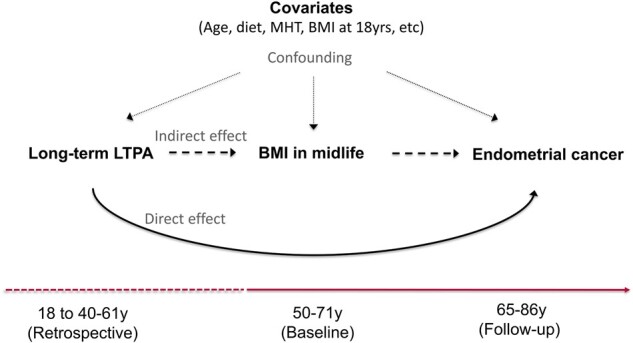Figure 1.

Directed acyclic graph for the physical activity–endometrial cancer association and mediation through body mass index (BMI) in midlife. The dashed and solid line at the bottom illustrates the timing of the measures. Women aged 50-71 years reported their BMI at baseline (ie, BMI in midlife) and provided information on several other risk factors for endometrial cancer risk (ie, confounders), including age (years), race-ethnicity (non-Hispanic White, non-Hispanic Black, Hispanic, other, or missing), education (less than high school, high school, post high-school or some college, bachelor degree or more, missing), smoking status and dose (never smoker, former smoker and ≤20 cigarettes per day, former smoker and >20 cigarettes per day, current smoker and ≤20 cigarettes pe day, current smoker and >20 cigarettes per day, missing), diet quality (2015 Healthy Eating Index; 0-100 points), total energy intake (kilocalories per day), alcohol consumption (grams per day), parity (number of births), use of oral contraceptives (never or <1 year, 1-4 years, 5-9 years, ≥10 years, missing), menopausal hormone therapy use (never, continuous estrogen plus progestin [EPT] use [15+ d/mo progestin], sequential EPT [<15 d/mo progestin], estrogen only, missing), and BMI at age 18 years (normal weight [<25.0 kg/m2], overweight [25.0-29.9 kg/m2], obese class I [30.0-34.9 kg/m2], obese class II [35.0-39.9 kg/m2], and obese class III [≥40.0 kg/m2]). At baseline, women retrospectively reported their participation in leisure time physical activity (LTPA) from ages 18 years through 40-61 years (ie, long-term LTPA). Incident endometrial cancer was ascertained during follow-up until women were 65-86 years. The solid line indicates the direct effect of long-term LTPA through adulthood on endometrial cancer risk and the long dashed line indicates the indirect effect of long-term LTPA on endometrial cancer that goes through BMI in midlife. The small dashed lines indicate the effects of confounders on these associations. MHT = menopausal hormone therapy use.
